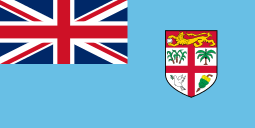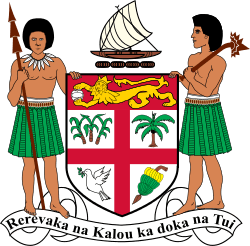Fiji and the United Nations
  | |
| United Nations membership | |
|---|---|
| Membership | Full member |
| Since | 1970 |
| UNSC seat | Non-permanent (never elected) |
| Ambassador | Peter Thomson |
Fiji established its Permanent Mission to the United Nations on 13 October 1970, three days after obtaining its independence from the United Kingdom. Since then, Fiji's participation in the United Nations has been notable primarily for its active role in UN peacekeeping operations, which began in 1978.[1]
List of ambassadors
The following individuals have held office as Ambassador of Fiji to the United Nations.[2]
| Order | Ambassador | Term of office |
|---|---|---|
| 1. | Semesa Sikivou | 1970–1976 |
| 2. | Berenado Vunibobo | 1976–1980 |
| 3. | Filipe Bole | 1980–1983 |
| 4. | Ratu Jone Radrodro | 1983–1985 |
| 5. | Winston Thompson | 1985–1991 |
| 6. | Ratu Manasa Seniloli | 1991–1995 |
| 7. | Poseci Bune | 1996–1999 |
| 8. | Amraiya Naidu | 1999–2003 |
| 9. | Isikia Savua | 2003–2008 |
| 10. | Berenado Vunibobo | 2008–2010 |
| 11. | Peter Thomson[3] | 2010–present |
Peacekeeping
Fiji soldiers served in the United Nations Interim Force in Lebanon, which Fiji's Major General George Konrote commanded in 1998 and 1999.[4]
The country has also contributed to other operations including Kosovo and Sinai,[5] and, in 2004, Fiji was the first country to volunteer troops to protect United Nations officials in Iraq. The BBC has remarked on Fiji's "long and proud history of sending its forces to the world's trouble-spots".[6] As of September 2004, 35 Fiji soldiers had been killed in the line of duty while serving on UN peacekeeping missions.[1]
As of April 2007, Fiji had 292 soldiers, police officers and military observers serving in United Nations peacekeeping operations in Iraq, Liberia, Sudan and Timor-Leste. Following the military coup in Fiji in December 2006, New Zealand and Australia urged the United Nations to suspend Fiji's participation in peacekeeping operations, at first to little avail. Questioned by media, a spokesman for the office of the Secretary-General stated that "[t]he United Nations is grateful for the service provided by Fijian personnel to UN peacekeeping operations over many years and for the Fijian personnel currently serving in dangerous UN assignments, including in Iraq".[7]
Fiji's military leader and interim Prime Minister Voreqe Bainimarama underlined his country's "proud track record in UN peacekeeping operations of professionalism, discipline, compassion and ability, training and ethics".[8] In September 2008, Fiji's participation in peacekeeping operations has reportedly been suspended.[9] In April 2009, however, United Nations peacekeeping missions were still employing 282 Fijian troops, military observers or police, a fact criticised by New Zealand Foreign Minister Murray McCully.[10]
Following lobbying from New Zealand and Australia, the United Nations announced that it would "continue to use Fijian police and soldiers in its current peacekeeping missions, but [would] not increase their numbers in future deployments".[11] In March 2010, this led newly appointed Fiji Ambassador Peter Thomson to approach U.N. Secretary General Ban Ki-moon to express Fiji's readiness and wish to commit further troops to U.N. peacekeeping operations.[12] As of June 2010, "Fiji troops are [...] the only UN blue helmets in Iraq since 2004 with a 221 strong contingent".[13]
Climate change
Issues emphasised by Fiji at the United Nations in recent years have included the effect of climate change, notably on Small Island Developing States. Addressing the United Nations General Assembly in September 2008, Prime Minister Commodore Voreqe Bainimarama stated:
- "On the issue of Climate Change, Fiji looks to, and is relying, on your leadership. This is a very critical issue for the very small island and atoll nations in the Pacific. While the rest of the World continues to endlessly debate the implications of climate change, in the very small islands and atolls in the Pacific, the problem is very much upon us; it is now a present and very real danger. It poses a serious risk to regional stability and security. I appeal to the international community, and its system of institutions, to enhance efforts to assist us address (sic) the threat of global climate change. We need investments in adaptation measures. We need to move from rhetoric to a more pragmatic and speedy response. We call upon the agencies, and our regional partners, to coordinate efforts to ensure that we in the Pacific region have the capacity, both human and institutional, to deal with this new threat, especially as it is getting stronger. The observed and potential impacts on our people and ecosystems, due to climate change, are all too real and immediate."[9] (bolded in original)
2010–11 voting record
Fiji voted in favour of[14]
- Resolution 65/454 (2010), on a follow-up to the Durban Declaration and Programme of Action (adopted 104 to 22)
- Resolution 65/202 (2010), on the right of the Palestinian people to self-determination (adopted by 177 to 6)
- Resolution 65/225 (2010), on the situation of human rights in the Democratic People’s Republic of Korea (adopted by 106 to 20)
- Resolution 65/L.78 (2011), on a review of the Human Rights Council (adopted 154 to 4)
Fiji abstained from voting on
- Resolution 65/456/Add.3 (2010), on the situation of human rights in Myanmar (adopted by 85 to 26)
- Resolution 65/L.53 (2010), on a moratorium on the use of the death penalty (adopted by 109 to 41)
- Resolution 65/226 (2010), on the situation of human rights in the Islamic Republic of Iran (adopted by 78 to 45)
Fiji voted against
- Resolution 65/224 (2010), on combating defamation of religions (adopted by 79 to 67)
References
- 1 2 Prime Minister Laisenia Qarase's to the 59th session of the United Nations General Assembly, 24 September 2004
- ↑ "History of the Mission", official website of Fiji's Mission to the United Nations
- ↑ "Thomson appointed Permanent Rep to the United Nations", 5 February 2010, Fiji government website
- ↑ "RFMF OVERSEAS DEPLOYMENTS", official website of the Republic of Fiji Military Forces
- ↑ Minister for Foreign Affairs and External Trade Kaliopate Tavola's address to the 61st session of the United Nations General Assembly, 26 September 2006
- ↑ "Fiji agrees to protect UN in Iraq", BBC, 20 October 2004
- ↑ "UN To Consider Fiji On 'Case By Case Basis'", Scoop.co.nz, 20 May 2007
- ↑ "UN told of coup cycle, peacekeeping link", Fiji Times, 1 October 2008
- 1 2 Prime Minister Voreqe Bainamarama's address to the 63rd session of the United Nations General Assembly, 26 September 2008
- ↑ Young, Audrey (22 April 2009). "McCully attacks UN for 'hypocritical' use of Fijian troops". The New Zealand Herald. Retrieved 30 September 2011.
- ↑ "UN bars Fijian peacekeepers in future missions", Xinhua, 2 May 2009
- ↑ "Fiji Envoy Meets UN Head To Discuss Country's Role In International Relations", All Headline News, 16 March 2010
- ↑ "Fiji to develop relations with Arab countries", Fiji Broadcasting Corporation, 26 June 2010
- ↑ Resolutions of the General Assembly
External links
- Official website of the Fiji Mission to the United Nations
- Ambassador Amraiya Naidu's address to the 56th session of the United Nations General Assembly, 16 November 2001
- Prime Minister Laisenia Qarase's address to the 57th session of the United Nations General Assembly, 19 September 2002
- Prime Minister Laisenia Qarase's address to the 59th session of the United Nations General Assembly, 24 September 2004
- Ambassador Isikia Savua's address to the 60th session of the United Nations General Assembly, 22 September 2005
- Minister for Foreign Affairs and External Trade Kaliopate Tavola's address to the 61st session of the United Nations General Assembly, 26 September 2006
- Prime Minister Voreqe Bainamarama's address to the 62nd session of the United Nations General Assembly, 28 September 2007
- Prime Minister Voreqe Bainamarama's address to the 63rd session of the United Nations General Assembly, 26 September 2008
- Prime Minister Voreqe Bainamarama's address to the 64th session of the United Nations General Assembly, 26 September 2009
- Prime Minister Voreqe Bainamarama's address to the 65th session of the United Nations General Assembly, 27 September 2010
- Prime Minister Voreqe Bainamarama's address to the 66th session of the United Nations General Assembly, 23 September 2011
